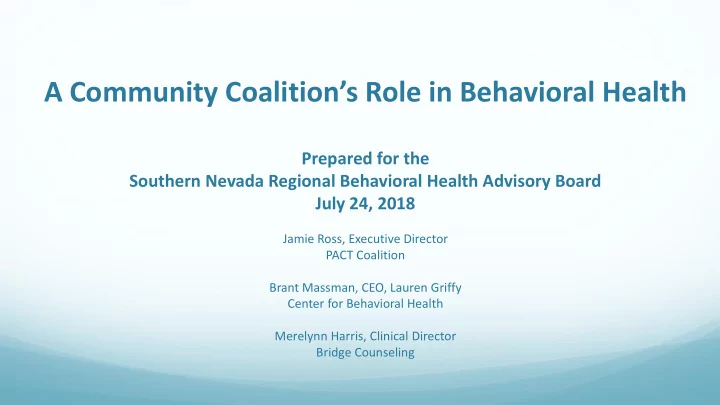

A Community Coalition’s Role in Behavioral Health Prepared for the Southern Nevada Regional Behavioral Health Advisory Board July 24, 2018 Jamie Ross, Executive Director PACT Coalition Brant Massman, CEO, Lauren Griffy Center for Behavioral Health Merelynn Harris, Clinical Director Bridge Counseling
Nevada’s Substance Abuse Prevention Structure 10 community coalitions serving 17 Nevada counties 1 statewide coalition partnership of which all are members All have a primary focus of substance abuse prevention All use data to drive decision making All use the same prevention planning framework All provide a neutral space to convene key community stakeholders All support direct service providers through funding and training
Prevention Approach in Nevada Community-based strategic prevention – locally driven, not state driven Multiple strategies across multiple sectors – no one method works alone Environmental strategies approach to affect change – must address policies, practices, and programs (public health approach) Applies to all issues facing our communities – including opioids and amphetamines
Statewide Prevention Initiatives Messaging – social media, TV, radio, movie theaters, newspapers, billboards, newsletters, bus shelters, taxis, school venues, websites, infographics, card racks, etc. Education – seniors, youth, parents, service providers, military, faith-based entities, mines, realtors, businesses, civic organizations, community forums, peer-to-peer, etc. Training – prescribers, medical personnel, law enforcement, first responders, criminal justice, schools administration, service providers, businesses, foster parents, etc. Diversion – drop boxes, Take Back days, disposal alternatives Early Intervention/Referrals – Mental Health First Aid, Signs of Suicide, drug testing, MOST (Mobile Outreach Safety Teams) Evidence-based programming
Evidence-Based Programs – Curriculum Based Smart Moves Life Skills Dare to Be You Too Smart to Start Project Success Project Toward No Drug Abuse Project Magic Mentoring Project Triple P Positive Action PATHS Staying Connected Project Alert Reconnecting Youth Parenting Wisely All Stars Staying Connected Nurturing Parents Project Venture Al’s Pals ABC’s of Parenting Boys Council Girls Circle Too Good For Drugs Funded entities include: B & G Clubs, Family Resource Centers, Probation, Tribes, Schools, Treatment, Teen Centers, Family Services, Shelters, Workforce Development, Support Groups, Various Nonprofits
Thank you for your time. Merelynn Harris Jamie Ross Brant Massman 702.474.6450 702.582.7228 208.367.9446 mharris@bcalv.com jross@drugfreelasvegas.org208. brant.massman@centerfor 367.9446 behavioralhealth.com Drugfreelasvegas.org
Recommend
More recommend